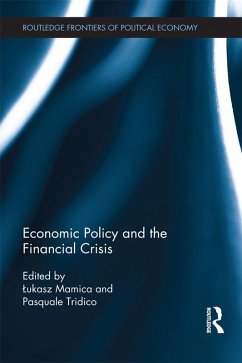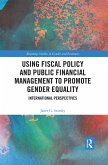Economic Policy and the Financial Crisis (eBook, ePUB)
Redaktion: Mamica, Lukasz; Tridico, Pasquale
34,95 €
34,95 €
inkl. MwSt.
Sofort per Download lieferbar

17 °P sammeln
34,95 €
Als Download kaufen

34,95 €
inkl. MwSt.
Sofort per Download lieferbar

17 °P sammeln
Jetzt verschenken
Alle Infos zum eBook verschenken
34,95 €
inkl. MwSt.
Sofort per Download lieferbar
Alle Infos zum eBook verschenken

17 °P sammeln
Economic Policy and the Financial Crisis (eBook, ePUB)
Redaktion: Mamica, Lukasz; Tridico, Pasquale
- Format: ePub
- Merkliste
- Auf die Merkliste
- Bewerten Bewerten
- Teilen
- Produkt teilen
- Produkterinnerung
- Produkterinnerung

Bitte loggen Sie sich zunächst in Ihr Kundenkonto ein oder registrieren Sie sich bei
bücher.de, um das eBook-Abo tolino select nutzen zu können.
Hier können Sie sich einloggen
Hier können Sie sich einloggen
Sie sind bereits eingeloggt. Klicken Sie auf 2. tolino select Abo, um fortzufahren.

Bitte loggen Sie sich zunächst in Ihr Kundenkonto ein oder registrieren Sie sich bei bücher.de, um das eBook-Abo tolino select nutzen zu können.
The key issue for current economic policy is to find a balance between the stabilisation of public finance and maintaining the momentum of long-term growth. This book argues that the reasons for the varied performances of the advanced economies lie in the economic policies which were introduced in the aftermath of the crisis and the differences in the regulation of their labour markets.
- Geräte: eReader
- mit Kopierschutz
- eBook Hilfe
- Größe: 5.46MB
Andere Kunden interessierten sich auch für
![The Economic Crisis in Social and Institutional Context (eBook, ePUB) The Economic Crisis in Social and Institutional Context (eBook, ePUB)]() The Economic Crisis in Social and Institutional Context (eBook, ePUB)34,95 €
The Economic Crisis in Social and Institutional Context (eBook, ePUB)34,95 €![Preventing the Next Financial Crisis (eBook, ePUB) Preventing the Next Financial Crisis (eBook, ePUB)]() Victor A. BekerPreventing the Next Financial Crisis (eBook, ePUB)40,95 €
Victor A. BekerPreventing the Next Financial Crisis (eBook, ePUB)40,95 €![Economic and Financial Aspects of Social Security (eBook, ePUB) Economic and Financial Aspects of Social Security (eBook, ePUB)]() J. Henry RichardsonEconomic and Financial Aspects of Social Security (eBook, ePUB)33,95 €
J. Henry RichardsonEconomic and Financial Aspects of Social Security (eBook, ePUB)33,95 €![Using Fiscal Policy and Public Financial Management to Promote Gender Equality (eBook, ePUB) Using Fiscal Policy and Public Financial Management to Promote Gender Equality (eBook, ePUB)]() Janet G. StotskyUsing Fiscal Policy and Public Financial Management to Promote Gender Equality (eBook, ePUB)42,95 €
Janet G. StotskyUsing Fiscal Policy and Public Financial Management to Promote Gender Equality (eBook, ePUB)42,95 €![The Global Economic Crisis (eBook, ePUB) The Global Economic Crisis (eBook, ePUB)]() The Global Economic Crisis (eBook, ePUB)46,95 €
The Global Economic Crisis (eBook, ePUB)46,95 €![Gender Perspectives and Gender Impacts of the Global Economic Crisis (eBook, ePUB) Gender Perspectives and Gender Impacts of the Global Economic Crisis (eBook, ePUB)]() Gender Perspectives and Gender Impacts of the Global Economic Crisis (eBook, ePUB)53,95 €
Gender Perspectives and Gender Impacts of the Global Economic Crisis (eBook, ePUB)53,95 €![Contemporary Economic Analysis (Routledge Revivals) (eBook, ePUB) Contemporary Economic Analysis (Routledge Revivals) (eBook, ePUB)]() Contemporary Economic Analysis (Routledge Revivals) (eBook, ePUB)56,95 €
Contemporary Economic Analysis (Routledge Revivals) (eBook, ePUB)56,95 €-
-
-
The key issue for current economic policy is to find a balance between the stabilisation of public finance and maintaining the momentum of long-term growth. This book argues that the reasons for the varied performances of the advanced economies lie in the economic policies which were introduced in the aftermath of the crisis and the differences in the regulation of their labour markets.
Dieser Download kann aus rechtlichen Gründen nur mit Rechnungsadresse in A, B, BG, CY, CZ, D, DK, EW, E, FIN, F, GR, HR, H, IRL, I, LT, L, LR, M, NL, PL, P, R, S, SLO, SK ausgeliefert werden.
Produktdetails
- Produktdetails
- Verlag: Taylor & Francis eBooks
- Seitenzahl: 320
- Erscheinungstermin: 26. März 2014
- Englisch
- ISBN-13: 9781134591527
- Artikelnr.: 40823946
- Verlag: Taylor & Francis eBooks
- Seitenzahl: 320
- Erscheinungstermin: 26. März 2014
- Englisch
- ISBN-13: 9781134591527
- Artikelnr.: 40823946
- Herstellerkennzeichnung Die Herstellerinformationen sind derzeit nicht verfügbar.
¿ukasz Mamica is Senior Lecturer in Public Economy and Innovation Policy at the Krakow University of Economics, Poland. Pasquale Tridico is Professor of Labour Economics and Jean Monnet Professor of European Integration Studies at the University Roma Tre, Italy. He is currently General Secretary of the European Association for Evolutionary Political Economy.
Introduction Lukasz Mamica and Pasquale Tridico Part I: Theory, Policies
and Institutions: A macroeconomic approach 1. Bridges to Babylon: Critical
Economic Policy From Keynesian Macroeconomics to Evolutionary Macroeconomic
Simulation Models Hardy Hanappi 2. Why Did Some Countries Perform Better
Than Others During The 2007-12 Crisis? Pasquale Tridico 3. Aiding Economic
Recovery after the Financial Crisis Malcolm Sawyer 4. Could More Labour
Market Flexibility Help Growth? Lessons from an amended Kaleckian model
Amitava Krishna Dutt, Sébastien Charles and Dany Lang 5. Institutions and
Youth Labour Markets in Europe during the Crisis Niall O'Higgins Part II:
Financial Regulations for Better Economic Stability 6. Financial
Regulations for Minimizing Economic and Social Crises: An evolutionary
developmental analysis with unequally rational individuals Pavel Pelikan
7. 'Liquidity' in Light of the Shadow Banking System: Lessons from the two
crises Anastasia Nesvetailova 8. Financial Instability and Functional
Finance: A Lerner-Minsky perspective Faruk Ülgen 9. Fiscal Consolidation
and Sovereign Debt Risk in Balance-Sheet Recessions: An agent-based
approach Marco Raberto, Silvano Cincotti and Andrea Teglio Part III:
Competitiveness and Sustainability in Times of Crisis 10. Leading Factors
for Catching-Up by Developing Economies: Conclusions from the crisis
Tomasz Geodecki 11. Added Value of Design as a Factor of Firm
Competitiveness in Times of Crisis ¿ukasz Mamica 12. The Decent Work
Basic-Relations-Fairness Approach in a Context of Crisis in Italy Martina
Lavagnini and Antonella Mennella 13. The Co-operative Firm: A lively
non-capitalist actor for troubled market economies Andrea Bernardi and Anna
Greenwood 14. Active Employment Policy in the EU and in Poland: A Gordian
Knot or Inertia Enchanted in Words? Leszek Cybulski and Ewa Pancer-Cybulska
and Institutions: A macroeconomic approach 1. Bridges to Babylon: Critical
Economic Policy From Keynesian Macroeconomics to Evolutionary Macroeconomic
Simulation Models Hardy Hanappi 2. Why Did Some Countries Perform Better
Than Others During The 2007-12 Crisis? Pasquale Tridico 3. Aiding Economic
Recovery after the Financial Crisis Malcolm Sawyer 4. Could More Labour
Market Flexibility Help Growth? Lessons from an amended Kaleckian model
Amitava Krishna Dutt, Sébastien Charles and Dany Lang 5. Institutions and
Youth Labour Markets in Europe during the Crisis Niall O'Higgins Part II:
Financial Regulations for Better Economic Stability 6. Financial
Regulations for Minimizing Economic and Social Crises: An evolutionary
developmental analysis with unequally rational individuals Pavel Pelikan
7. 'Liquidity' in Light of the Shadow Banking System: Lessons from the two
crises Anastasia Nesvetailova 8. Financial Instability and Functional
Finance: A Lerner-Minsky perspective Faruk Ülgen 9. Fiscal Consolidation
and Sovereign Debt Risk in Balance-Sheet Recessions: An agent-based
approach Marco Raberto, Silvano Cincotti and Andrea Teglio Part III:
Competitiveness and Sustainability in Times of Crisis 10. Leading Factors
for Catching-Up by Developing Economies: Conclusions from the crisis
Tomasz Geodecki 11. Added Value of Design as a Factor of Firm
Competitiveness in Times of Crisis ¿ukasz Mamica 12. The Decent Work
Basic-Relations-Fairness Approach in a Context of Crisis in Italy Martina
Lavagnini and Antonella Mennella 13. The Co-operative Firm: A lively
non-capitalist actor for troubled market economies Andrea Bernardi and Anna
Greenwood 14. Active Employment Policy in the EU and in Poland: A Gordian
Knot or Inertia Enchanted in Words? Leszek Cybulski and Ewa Pancer-Cybulska
Introduction Lukasz Mamica and Pasquale Tridico Part I: Theory, Policies
and Institutions: A macroeconomic approach 1. Bridges to Babylon: Critical
Economic Policy From Keynesian Macroeconomics to Evolutionary Macroeconomic
Simulation Models Hardy Hanappi 2. Why Did Some Countries Perform Better
Than Others During The 2007-12 Crisis? Pasquale Tridico 3. Aiding Economic
Recovery after the Financial Crisis Malcolm Sawyer 4. Could More Labour
Market Flexibility Help Growth? Lessons from an amended Kaleckian model
Amitava Krishna Dutt, Sébastien Charles and Dany Lang 5. Institutions and
Youth Labour Markets in Europe during the Crisis Niall O'Higgins Part II:
Financial Regulations for Better Economic Stability 6. Financial
Regulations for Minimizing Economic and Social Crises: An evolutionary
developmental analysis with unequally rational individuals Pavel Pelikan
7. 'Liquidity' in Light of the Shadow Banking System: Lessons from the two
crises Anastasia Nesvetailova 8. Financial Instability and Functional
Finance: A Lerner-Minsky perspective Faruk Ülgen 9. Fiscal Consolidation
and Sovereign Debt Risk in Balance-Sheet Recessions: An agent-based
approach Marco Raberto, Silvano Cincotti and Andrea Teglio Part III:
Competitiveness and Sustainability in Times of Crisis 10. Leading Factors
for Catching-Up by Developing Economies: Conclusions from the crisis
Tomasz Geodecki 11. Added Value of Design as a Factor of Firm
Competitiveness in Times of Crisis ¿ukasz Mamica 12. The Decent Work
Basic-Relations-Fairness Approach in a Context of Crisis in Italy Martina
Lavagnini and Antonella Mennella 13. The Co-operative Firm: A lively
non-capitalist actor for troubled market economies Andrea Bernardi and Anna
Greenwood 14. Active Employment Policy in the EU and in Poland: A Gordian
Knot or Inertia Enchanted in Words? Leszek Cybulski and Ewa Pancer-Cybulska
and Institutions: A macroeconomic approach 1. Bridges to Babylon: Critical
Economic Policy From Keynesian Macroeconomics to Evolutionary Macroeconomic
Simulation Models Hardy Hanappi 2. Why Did Some Countries Perform Better
Than Others During The 2007-12 Crisis? Pasquale Tridico 3. Aiding Economic
Recovery after the Financial Crisis Malcolm Sawyer 4. Could More Labour
Market Flexibility Help Growth? Lessons from an amended Kaleckian model
Amitava Krishna Dutt, Sébastien Charles and Dany Lang 5. Institutions and
Youth Labour Markets in Europe during the Crisis Niall O'Higgins Part II:
Financial Regulations for Better Economic Stability 6. Financial
Regulations for Minimizing Economic and Social Crises: An evolutionary
developmental analysis with unequally rational individuals Pavel Pelikan
7. 'Liquidity' in Light of the Shadow Banking System: Lessons from the two
crises Anastasia Nesvetailova 8. Financial Instability and Functional
Finance: A Lerner-Minsky perspective Faruk Ülgen 9. Fiscal Consolidation
and Sovereign Debt Risk in Balance-Sheet Recessions: An agent-based
approach Marco Raberto, Silvano Cincotti and Andrea Teglio Part III:
Competitiveness and Sustainability in Times of Crisis 10. Leading Factors
for Catching-Up by Developing Economies: Conclusions from the crisis
Tomasz Geodecki 11. Added Value of Design as a Factor of Firm
Competitiveness in Times of Crisis ¿ukasz Mamica 12. The Decent Work
Basic-Relations-Fairness Approach in a Context of Crisis in Italy Martina
Lavagnini and Antonella Mennella 13. The Co-operative Firm: A lively
non-capitalist actor for troubled market economies Andrea Bernardi and Anna
Greenwood 14. Active Employment Policy in the EU and in Poland: A Gordian
Knot or Inertia Enchanted in Words? Leszek Cybulski and Ewa Pancer-Cybulska







